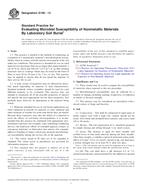Wir benötigen Ihre Einwilligung zur Verwendung der einzelnen Daten, damit Sie unter anderem Informationen zu Ihren Interessen einsehen können. Klicken Sie auf "OK", um Ihre Zustimmung zu erteilen.
ASTM G160-12
Standard Practice for Evaluating Microbial Susceptibility of Nonmetallic Materials By Laboratory Soil Burial
Automatische name übersetzung:
Standard Praxis für die Bewertung von mikrobiellen Empfindlichkeit von Nichtmetallische Werkstoffe Durch Laborboden Burial
NORM herausgegeben am 1.11.2012
Informationen über die Norm:
Bezeichnung normen: ASTM G160-12
Anmerkung: UNGÜLTIG
Ausgabedatum normen: 1.11.2012
SKU: NS-57479
Zahl der Seiten: 3
Gewicht ca.: 9 g (0.02 Pfund)
Land: Amerikanische technische Norm
Kategorie: Technische Normen ASTM
Kategorie - ähnliche Normen:
Die Annotation des Normtextes ASTM G160-12 :
Keywords:
biodegradeable, biological deterioration, defacement, disfigurement, fungal resistance, fungi, laboratory soil culture, microbial susceptibility, microbiological deterioration, mildew, mixed microbial innoculum, mold growth, soil environment, ICS Number Code 19.040 (Environmental testing)
Ergänzende Informationen
| Significance and Use | ||||
|
3.1 These results may be used to compare the susceptibility of materials when exposed to this test procedure. 3.2 Microbiological susceptibility may be reflected by a number of changes including staining, weight loss, or reduction in tensile or flexural strength. 3.3 This practice may be considered an inoculation with a mixed culture of fungi and bacteria. |
||||
| 1. Scope | ||||
|
1.1 This practice is limited to the method of conducting an evaluation of a nonmetallic material's microbiological susceptibility when in contact with the natural environment of the soil under use conditions. This practice is intended for use on solid material test specimens that are no larger than approximately 2 cm (0.79 in.) thick and 100 cm 2 (15.5 in.2) or on film forming materials such as coatings which may be tested in the form of films at least 50 by 50 mm (2 by 2 in.) in size. This practice may be applied to articles that do not spend the majority of their service life in soil. 1.2 A wide variety of properties may be affected by microbial attack depending on material or item characteristics. Standard methods (where available) should be used for each different property to be evaluated. This practice does not attempt to enumerate all of the possible properties of interest nor specify the most appropriate test for those properties. Test methods must, however, be appropriate to the material being tested. 1.3 Materials intended for use in soil burial applications are often subjected to periods of exposure to solar radiation and other elements of weather for some time before they are buried. Because these exposures may alter the ability of a material to resist the effects of soil-borne microorganisms, it is recommended that this practice be combined with appropriate environmental exposures (for example, solar simulating weathering devices, the hydrolytic effects of extended aqueous contact, or extraneous nutrients) or fabrication into articles (for example, adhesive bonding of seams) which may promote microbiological susceptibility during the service life of the material. 1.4 The values stated in SI units are to be regarded as standard. The values given in parentheses are provided for information purposes only. 1.5 This standard does not purport to address all of the safety concerns, if any, associated with its use. It is the responsibility of the user of this standard to establish appropriate safety and health practices and determine the applicability of regulatory limitations prior to use. |
||||
| 2. Referenced Documents | ||||
|
Ähnliche Normen:
Historisch
1.7.2013
Historisch
15.12.2012
Historisch
1.6.2013
Historisch
1.6.2009
Historisch
1.6.2013
Historisch
1.12.2009



 ASTM G153-13
ASTM G153-13 ASTM G154-12a
ASTM G154-12a ASTM G155-13
ASTM G155-13 ASTM G156-09
ASTM G156-09 ASTM G169-01(2013)..
ASTM G169-01(2013).. ASTM G201-09
ASTM G201-09 Cookies
Cookies
